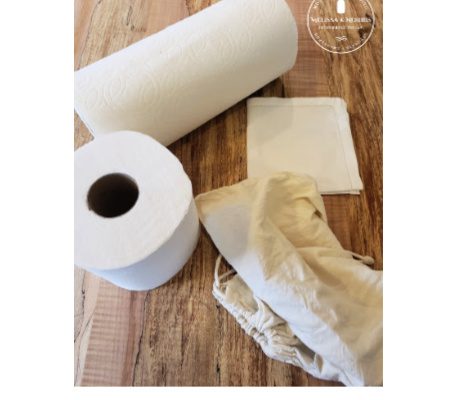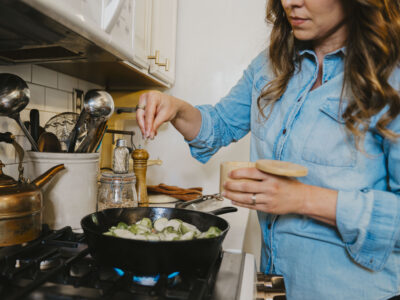Tiolet paper substitutes and homemade options for reusable household items. Most homesteaders are already looking for ways to make things at home, but now more than ever, many of us may need substitutes for toilet paper and paper towels. Don’t worry, we’ve got you covered.
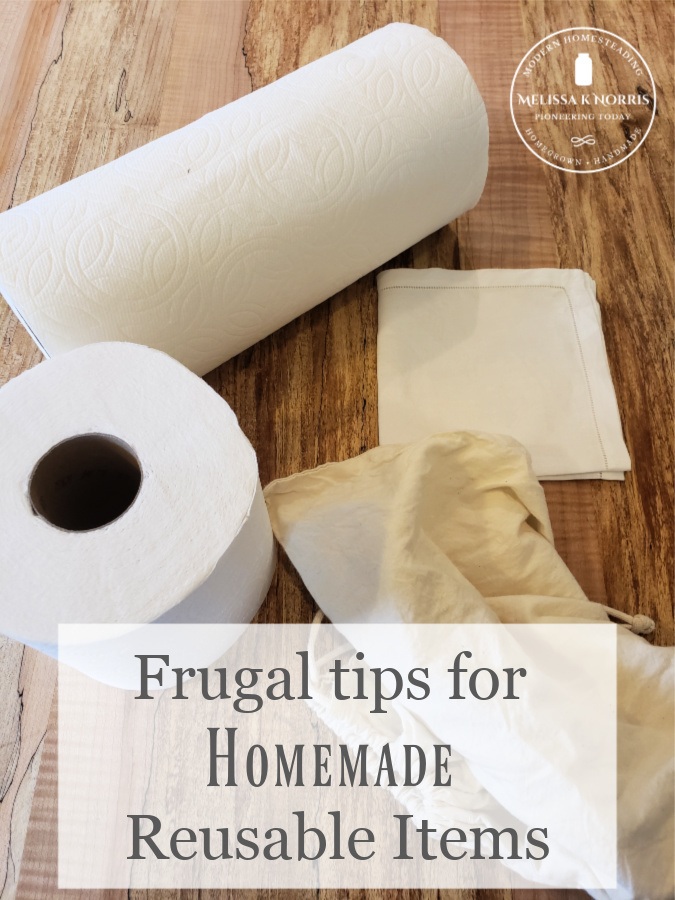
Listen in below to the full podcast, Episode #249 Toilet Paper Substitutes & Tips for Reusable Household Items of the Pioneering Today Podcast, where we don’t just inspire you, but give you the clear steps to create the homegrown garden, pantry, kitchen, and life you want for your family and homestead.
🍞 Struggling With Sourdough?
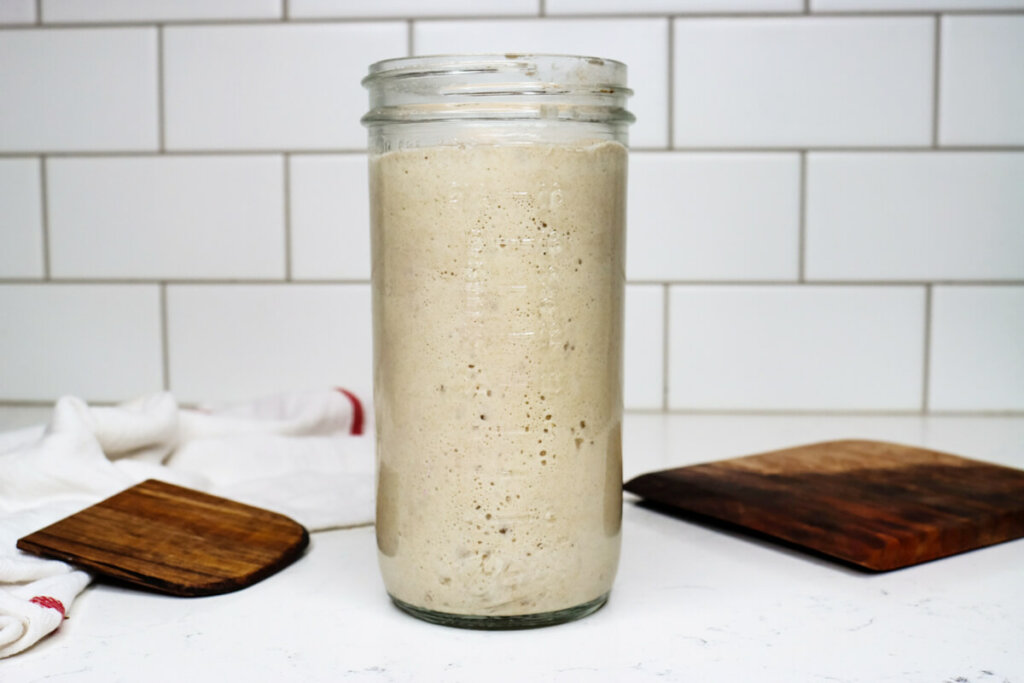
If your starter won’t take off, your loaves are dense and hard, or sourdough just flat-out overwhelms you…
👉 I’ll show you how to fix all of it.
Join my FREE workshop and learn how to make a bubbly, active starter—the right way, from Day One.
Table of Contents[Hide][Show]
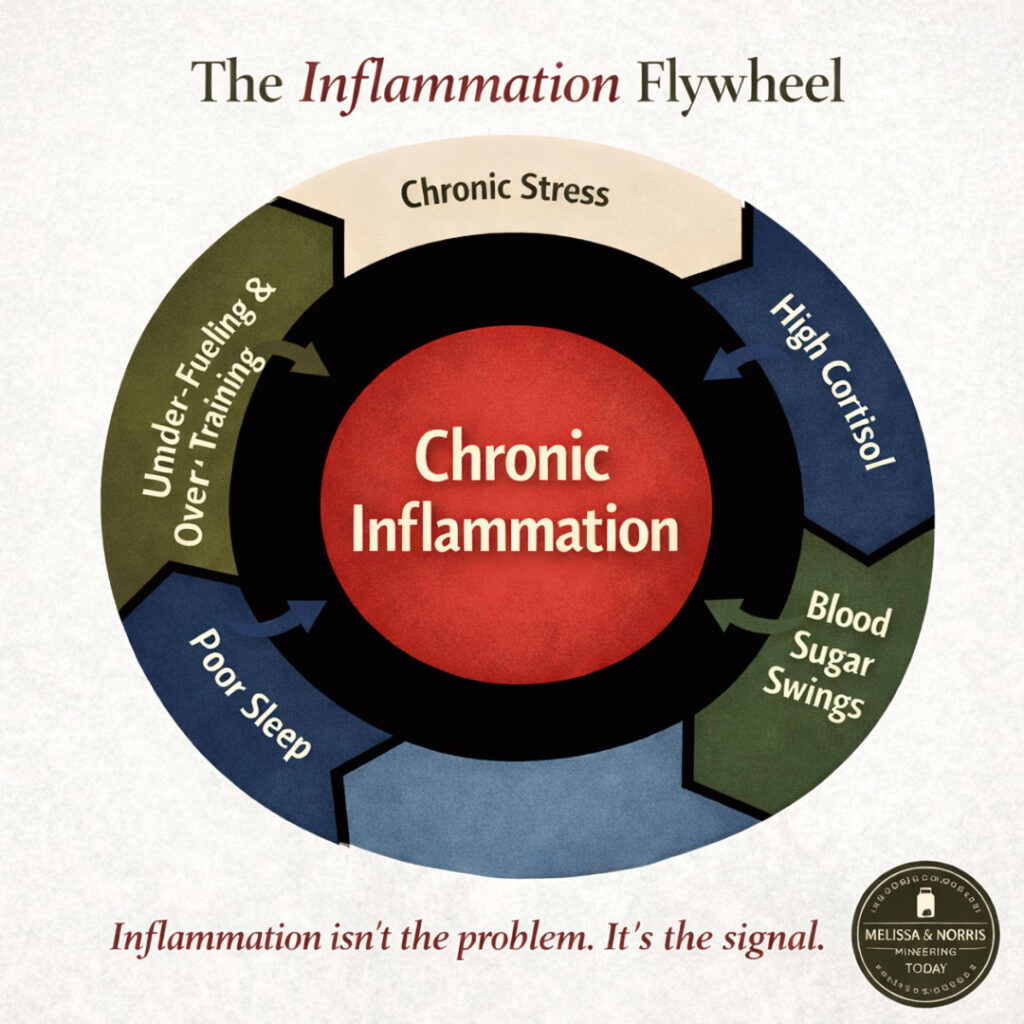
The Hidden Cycle Keeping You Inflamed
If you’ve been feeling puffy, tired, achy, or wired-but-tired, this two-page guide will help you understand what may be happening behind the scenes — even if you’re eating “healthy.”
Download the Inflammation Flywheel Guide and learn:
- Where to start so you don’t feel overwhelmed
- The 5 most common drivers that keep inflammation switched on
- Why blood sugar swings, stress, and poor sleep feed each other
What To Do If You Run Out of Paper Products
Melissa: Right now we’re experiencing the inability to get things at the grocery store or other stores we’re used to getting stuff. Like one-time use items like paper towels and toilet paper. So I think it’s great to have Kris on because she’s had experience prior to this situation in being resourceful and less wasteful. Given this situation, I think there are steps we can do to make things better long-term. Kris, what are some ideas or substitutes that we can do in our own homes to replace single-use items and waste?
Kris: I think you’re right, ultimately this situation is going to help people break some of those habits, like the paper towel habit, or other things that are in ready-made and plastic containers.
Paper Towel
I don’t use paper towels. I haven’t had them in my house for years and years. That’s an easy one to replace. I take old T-shirts and cut them into squares and use them for wiping things up. I have to touch on the toilet paper issue. Everyone’s panicking about toilet paper, right? And to me, if I have money to help my family prepare, I’m going to spend it on food. I’m not going to spend it on toilet paper because there are so many alternatives to toilet paper.
Toilet Paper Substitutes
I actually wrote about this recently to educate people. These toilet paper alternatives are things that people can do and they’re not even really archaic. They’re civilized options. Some of the options had to be planned for as far as a toilet paper replacement, like installing a bidet seat and such. I understand that those are selling out right now too. But there are alternatives to toilet paper so people really should be taking their money and buying food with it.
Melissa: I’m with you. The food makes a lot more sense to me than the toilet paper. Growing up a country girl and living quite rurally there were a lot of times we’d be out in the back forty fixing fence and there’s no bathroom out there but when ya gotta go you gotta go! There are a lot of leaves that you can use. I’d be cognizant of what leaf you’re choosing though because it’s a delicate area, but it works. It’s not ideal. And I realize that if you live in the middle of the city, that’s probably not an option for you.
My dad grew up with an outhouse and they didn’t always have toilet paper either. But they would save old magazines (go through and pull out the articles you want to keep) and stack them in the outhouse. That’s what they use for number two. I’d love some of your other suggestions in addition to the bidet that you mentioned.
To Save or Toss?
I’d also like to know, how do you use the T-shirts that you’ve cut up for use as a paper towel? Like, when there is nasty icky, sticky stuff do you have a bucket of water and bleach (I only use hydrogen peroxide-based bleach) that you put the rag in and then throw it in the washing machine for when the next load is washed?
Kris: It depends on what it is. It’s something really yucky I honestly will just scoop it up and throw it away. Like if I’m cleaning up cat vomit or something that you would normally use paper towels. They’re upcycled t-shirt rags already so I’m not going to be super concerned about throwing it away. But for other things, like just wiping something up off the counter, or kids drying hands, those go straight into the laundry. I don’t have any special set-up really.
Wipes, which I know a lot of people use in their home too, can easily be made too. I don’t bother with that really. I’ll wet a rag if I need a wet one. I don’t have a problem wetting it. In my book, Attainable Sustainable: The Lost Art of Self-Reliant Living, I have a recipe for ready-made wipes for people who prefer them.
Melissa: I don’t use wipes either, so I’m with you. If I need it wet, I just wet and spray it with something if I feel it needs a disinfectant.
Family Cloth
To backtrack to the toilet paper options, especially for people who don’t live rurally and don’t have leaves at their disposal like I do. Do you have any other tips for doing family cloth? I’m familiar with it but haven’t implemented at our home. This would be helpful for those who are looking to make the switch too.
Kris: Family cloth is probably going to be easiest for people to implement right now. I’ve had people respond to my post very grossed out about the whole thing. They’d never dream of doing it, which is fine. It may be too much now but what happens when you do really run out of toilet paper? You’ll want to know this.
Again, it’s squares of old t-shirts torn into pieces. You’re not using your nice clothes. This is something specific. I have seen people talk about having specific colors for different family members so there’s no cross-contaminating. So if you’re designated pink, you’re always the pink person. That could make me feel a little better about using it.
We were a cloth diapering family. It’s essentially like cloth diapering to a point that when you’ve used the wipes you need someplace to put them in like a small container that has a lid on it so they can be put away. You’ll need to launder every day or two in hot, hot water. Not to get too overly detailed, but when people are using it just to dry themselves for a number one, it’s usually a dry cloth. A wet cloth might be better for number two.
Melissa: Got it. Cloth diapering isn’t done nearly as much as it used to be. So knowing to have a container is key. My mom would just use a bucket that had a lid on it. The bucket has a diluted amount of bleach in it to help keep it more sanitized and help keep smells down.
I like the idea of using a different color per person. That’s a great idea. I hadn’t actually heard that before. We talked about doing bidets over a year ago and just never proceeded with it so I think that’s something that we’re going to look at. I think those are all really great suggestions and something for people to think about.
Old t-shirts…those things can be turned into so many things from rag rugs to rags. They’re like gold.
Alternatives to Plastic Wrap and Tin Foil
As we’re talking about these things my mind keeps going back to the kitchen cause that’s where I spend a lot of my time. Especially now that my kids are home from school. So let’s talk about plastic wrap and tin foil because those are things a lot of people use in their houses. These can be reused but a lot of people don’t. So talking about food storage, I use a ton of mason jars and lids, but there are some things where I will admit that plastic wrap and tin foil can be handy. Tell me about how you replace them or how you function without them.
Kris: I have people come to my house and go through all my drawers because they’re convinced I have to have some somewhere. But I don’t. I also use mason jars for storing more wet ingredients or leftover soup and such. I have a collection of lidded glass containers. I have beeswax wraps. I don’t use them all the time, they’re not my usual go-to. My go-to is either the mason jar or the reusable glass containers. But if I have a big bowl that doesn’t have a lid, I have made beeswax wraps that will go over them so that I can store them in the refrigerator.
The other things that people will use are plastic bags for storing produce. I have found using dampened flour sack towels works well. I’ll use those to store and hold lettuce. I’ll wrap the lettuce in a damp flour sack towel and keep them in the produce drawer in the refrigerator. I’ve also just put the stuff lose in those drawers but I lay down a damp towel inside those drawers. That seems to help hold them a little bit.
Tinfoil, it can be reused. I can’t say I don’t ever use it. It comes out once in a while. We had a situation recently where we butchered a wild boar and could not find butcher paper or freezer paper anywhere. Nobody had it in stock. I guess nobody uses this stuff anymore. So we ended up wrapping in wax paper first and then did tinfoil. We were in a pinch so we used it. But for the most part, it’s not something that we sue around here.
Melissa: I love the suggestion of the damp tea towels. I’ve found, especially with things like lettuce, if I wrap them in something damp, which, to be honest, has been a damp paper towel, and sealed it up that it would increase the fridge life by almost a week compared to not doing that. I’m definitely going to incorporate using the tea towels instead of the paper towel.
What To Do When Not Everyone is on the Same Page
How do you handle it when not every family member is on the same page with wanting to do the waste reduction?
Kris: Yeah, this is the case in my household. I have one son who is really on board with me and another son who actually does not live with me any longer…he’s an adult. He’s not interested in it so much. My husband is a man of habit. The way I’ve handled it is to just be patient and to educate. It’s been over the course of years, with slow steady steps, he has made the shift and he’s becoming more aware of the plastic that he’s bringing home and realizing it’s a problem.
I just mostly kept saying, you can get this in glass. Or we can make that at home instead. One of the things we started making at home is sour cream. Not only are we making it at home and we no longer have these plastic containers, but my husband is making it at home. He’s a little bit finicky about the taste. It has to taste like he’s used to getting from the store. But the recipe is good and it’s so easy that he does it. So being patient and making them aware that it’s a habit that could be broken.
Melissa: I feel like this is the case in a lot of households and maybe it’s not your husband. It could be the reversal or it could be an older child. Younger kids we’re instilling these habits. I’m really adamant on our laundry detergent and not using scented fabric softeners. So it’s a big deal for me. My husband loves the scent of the synthetic fake scented laundry detergent. And I refuse to buy it. I just dug my heels in and insisted that I wasn’t using it. I’m not using it on my clothes, I’m not buying it. I did this thinking that if I do this, then I’m eliminating it from my house. Well, no, he bought his own bottle. But you know what? He does his own laundry now if he wants it washed in that detergent. I could throw a big fit but since he’s doing it himself I don’t. I can’t make the decision for him if he feels that strongly about it. He knows not to put any of my laundry in with his and is respectful of that.
I wish it was the opposite and that he was on the same page as me, but he is doing is laundry now. So I’ve picked my battles. He does make his own kimchi in mason jars.
I feel it’s a journey. Some of our journey may be a bit faster on this particular road in the next few months than it would’ve been without it. But we have to remember it is a journey and to expect push back as we’re trying to change habits.
Kris: Right. We’re in a crazy situation right now with the coronavirus pandemic, but in a normal situation, it’s a matter of small steps. My husband has gotten to this point over the course of a lot of years of me doing things homemade or me doing things a certain way. I probably have habits too that could be broken, although, I can’t think of any right now.
Sometimes I’ll realize I’ll be doing something and think that I could do it a different way that would be healthier or produce less waste. Just being aware of what we are doing will make a difference down the line.
Melissa: I feel like we’re really talking about the real side of it. There’s always the idealist side and then there’s reality.
Looking at Your Waste Generation in a Different Way
You’ve been doing this for a number of years, so I know you’re way ahead of the curve, but what are the items that present the biggest problem in your house with trying to reduce the disposable waste? Where do you feel you’re still struggling a little bit?
Kris: Snacks. We are a nation of snackers and snacks come in packages, whether it’s tortilla chips or crackers. We’ve definitely cut a lot of that out. If I were to choose one item that keeps making its way into our house, that generates waste, granted it’s probably a small amount compared to a lot of other things, but it’s tortilla chips. Chips and salsa are fabulous, right? Who’s going to argue with that?
I’ve been trying to cut back and we’re not having as much, but still, there’s not a way to generate that unless I’m making my own tortillas and making my own chips. There’s not an easy way to replicate that snack in my house. While I might say I feel like tortilla chips today and I’m going to make it, and it’s going to be a process and it’ll be great, people want that more frequently than I’m willing to go to that effort quite honestly.
Melissa: I’m with you. All of our salsa is homegrown and home-canned, but we do buy tortilla chips. I do make homemade tortillas and have cut them up and fried or baked them to make my own chips…but it’s a lot of work. It’s hard to match the ease of that bag and the volume for that frequency that we like to have the chips. When we have leftover taco meat or refried beans it’s really easy to throw part of a bag of chips on a cookie sheet, put the toppings on, put it on low broil and you have a pretty easy supper. Like you I make a lot of our sour cream, the salsa, the refried beans so, for the most part, I feel like it’s a homegrown homemade supper, but the chips are still bought.
Kris: Sometimes you gotta have the chips. Changing the way we think a little bit and realizing that maybe we really like the chips but we should cut back to maybe once a month so that there’s less waste. I don’t think cutting stuff out completely is necessary but I think that if it’s something you’re aware of that your household is going through bags and bags of tortilla chips and that’s generating a fair amount of plastic bag waste, maybe there’s an alternative that could occur.
Melissa: If nothing else in this particular time of events, it’s making us aware of things that we are doing that is part of our habits that we’ve gotten used to and it’s making us think about it in ways that we probably haven’t had to honestly think about before. Whether or not that changes our habits or not. It may or may not, but at least we’re aware of it. And I think that’s a good thing.
Kris: I agree. I think it is definitely going to wake people up as far as realizing what the convenient items that you fall back on all the time. All of a sudden you’re trying to not go to the market, what are you going to do instead? Do you really need that? Maybe you don’t really.
What I’m seeing in my house is that we’re being a little bit more cautious about food waste. You know, there’s a little bit of rice leftover, we’re not going to throw that away. It’s going to be saved and go in a supper or someplace else. And we’re eating more simply. We’re leaning on some of these pantry staples more so rather than going to the farmer’s market since we’re trying to stick close to home so that we’re not out and about.
Melissa: Same here. Last night I cooked up supper and it was a mix of homemade refried beans and some taco meat. Since I had some white cornmeal I made up some pupas instead of doing tortillas. Pupas is from South America and is kind of like an inside out taco but less work than rolling out the tortillas. It’s a pretty quick supper to do and one of our favorites. We had an extra filling and other extra stuff and the first thought was how can we reuse this and maximize other fresh ingredients that I have on hand so that we’re saving the stuff that’s not perishable in case we need it further down the road.
Kris: I’ll tell you a trick that I do to help with those little bits of things, like little bits of rice, green beans, etc. I keep them in my freezer in an empty jar. I just add the little bits to the jar. You have to be careful about mixing flavors and think ahead because this is going to become soup. So if I’ve got a quart jar in there and I throw a little bit of green beans and if I have a marinara sauce jar and I rinse it out, I’ll put that liquid in there. Leftover sauteed mushrooms, what have you. Rice, pasta..it’ all goes in there. When it’s full I can easily turn that into soup. I’ll do the same thing with a lot of Mexican food. Just keep the flavors in a different jar so that it can become a more Mexican flavored soup.
Melissa: I love that idea. I do that with raw odd and end things for my broth container in the freezer. I’ll put the end of a carrot, the weird end of celery, or the little bit of onion with part of the skin still on it.
Kris: My friend calls it Memory Lane Soup because it includes all these things from the past month that I’ve eaten.
Where to find Kris:
More Articles You May Enjoy
- Dealing with Emotions During the Holidays (Surrounding COVID and 2020 Realities)
- 9 Things To Do Now for Fall COVID Preparations
- 7 Things We’ll Never Go Back to Since COVID19
- Coronavirus Homestead Plan to Alleviate Fear & Be Prepared
- COVID Remedies & Online Censorship
- Impact of Being in the Midst of a Crisis How Homesteading Helps
- 37 Ingredient Substitutions Everyone Should Know
- 13 Pantry Items to Always Have on Hand
- 17 Self-Sufficiency Lessons from the 1940’s & Great Depression (Interview with my Dad)
